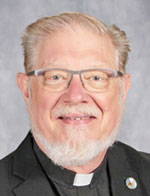That All May Be One / Fr. Rick Ginther
The Church is the universal instrument, the sacrament of salvation
 Last month, we focused upon polarization and polarized thinking.
Last month, we focused upon polarization and polarized thinking.
As promised, this month we are focusing upon teachings of the Church: no salvation outside the Church, and the necessity of baptism.
These can be perceived as polarizing. But are they?
The Church is the universal instrument, “sacrament” of salvation. She is the visible presence of Christ on Earth. It is for her to spread the good news of salvation in and through Christ. He gave her this mission (Mt 28:16-20).
The Church “is the visible plan of God’s love for humanity,” because God desires “that the whole human race may become one people of God, form one body of Christ, and be built up into one temple of the Holy Spirit.” (Pope Paul VI, June 22, 1973; “Ad Gentes” 7, #2; “Lumen Gentium,” #17).
The Church is the “sign and instrument” of the full realization of the unity yet to come (Catechism of the Catholic Church
[CCC], #775).
Without the Church and its mission, salvation in Christ would not be known.
The affirmation “there is no salvation outside the Church,” often repeated by the Church Fathers in the first centuries of the Church, has a somewhat negative tone.
Reformulated positively, it means that “… all salvation comes from Christ the Head through the Church which is his Body” (CCC, #846).
In keeping with the Church’s continued focus on ecumenism (relations with other Christians, cf. “Unitatis Redentigratio”), such a positive reformulation comes across less harshly.
The catechism states: “Baptism is necessary for salvation for those to whom the Gospel has been proclaimed and who have had the possibility of asking for this sacrament” (CCC, #1257).
This paragraph concludes: “God has bound salvation to the sacrament of baptism, but he himself is not bound by his sacraments” (CCC, #1257).
This last statement leads to the following paragraphs. They lay out that “… those who suffer death for the sake of the faith without having received baptism are baptized by their death for and with Christ” (CCC, #1258).
It continues, “For catechumens who die before their baptism, their explicit desire to receive it, together with repentance for their sins, and charity, assures them the salvation that they were not able to receive through the sacrament” (CCC, #1259).
“Since Christ died for all, and since all men are in fact called to one and the same destiny, which is divine, we must hold that the Holy Spirit offers to all the possibility of being made partakers, in a way known to God, of the paschal mystery” (CCC, #1260).
“Every man who is ignorant of the Gospel of Christ and of his Church but seeks the truth and does the will of God in accordance with his understanding of it, can be saved. It may be supposed that such persons would have desired baptism. explicitly if they had known its necessity” (CCC, #1260).
Lastly, “as regards children who have died without baptism, the Church can only entrust them to the mercy of God, as she does in her funeral rites for them” (CCC, #1261).
Together, these statements affirm both the necessity of baptism and, in its absence, divine mercy for salvation of all.
As noted in the conclusion of paragraph 1257 above, God himself is not bound by the sacraments. Thus, the gift of salvation is open to people of other religions.
Seeking truth, doing the will of God as they are able to grasp it, and living lives of charity (Mt 25:31-46) may lead them to this divine gift.
We are on mission to reveal Christ. We are the Church, the sacrament of salvation.
In our hearts, then, charity toward our brothers and sisters, Christians and others who sincerely seek God, is essential.
Such hearts are antithetical to polarization.
(Father Rick Ginther is director of the archdiocesan Office of Ecumenism and Interreligious Affairs. He is retired from full-time pastoral ministry, but is still active as a priest of the archdiocese.) †
 Last month, we focused upon polarization and polarized thinking.
Last month, we focused upon polarization and polarized thinking.